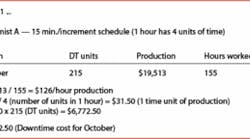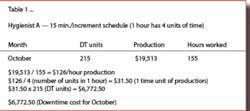by Dianne D. Glasscoe, RDH, BS
Dear Dianne,
I’ve been doing hygiene for almost 20 years, and I’ve worked in several different offices. However, I have never worked with a doctor who frets over openings in the schedule as much as my current employer. He gets visibly upset if I don’t have a patient in my chair. My operatory is at the end of the hall, and he makes numerous trips just to peek in to see what I’m doing. Once, when I was in the restroom, he knocked on the door and asked if I was in there! I was shocked and embarrassed!
I should mention that we’ve had difficulty keeping the schedule full the past year. The unfilled openings in my schedule appear to coincide with the hiring of a new front-desk assistant. The former assistant was very good at keeping my schedule full, and rarely did I have unfilled time. Now, I average at least two openings every day, and I’ve had a few days that completely fell apart. Normally I see about nine patients per day, but there have been days where I only saw three to four patients. Our front-desk assistants always appear busy, but sometimes I wonder what they are really doing.
I feel like I’m under the doctor’s microscope, and his anxiety over my schedule is making me a nervous wreck! I’ve been in this office four years, but I’ve come to dread going to work. For some reason, I’m made to feel guilty when my schedule is not full. I want to shout, It’s not my fault!
Short of leaving, is there anything I can do to get the doctor off my back?
Feeling the Pressure
Dear Feeling the Pressure,
Being the object of someone’s constant scrutiny is uncomfortable and nerve-racking, and I would not want to trade places with you!
It is obvious there is a problem at the front desk, and I suspect the new assistant was not trained properly when she was hired. Sometimes, new business assistants are thrown into positions with little or no training and no job description, yet they are expected to perform like seasoned professionals. Plus, new assistants do not know the patients and the many nuances involved in working with a particular patient base.
In my consulting business I have worked with many different front-desk assistants. I have seen superstars and slackers and many mediocre performers. However, the best ones are those with a clear understanding of the priorities of their position and a strong work ethic. In fact, practice profitability rests on a business assistant’s ability and willingness to do his/her job well. It sounds like the former assistant in your office was a go-getter who took her job seriously and understood that her primary responsibility was keeping clinical people busy.
At the front desk, there are two primary responsibilities - scheduling and financial management. Typically, one person is the scheduling coordinator and another person is the financial coordinator. There needs to be clear, concise job descriptions for each position, and the doctor should hold business assistants accountable for the performance of their particular positions. Fortunately, each assistant’s efficiency can be (at least partially) measured in numbers. For the financial assistant, that number would be the collections percentage of adjusted production, and it should be 98 percent or better. For scheduling coordinators, the number is downtime percentage of total available time for various clinicians. To measure downtime percentage, downtime has to be tracked. We like to see downtime at 5 percent or less.
The doctor would do well to redirect his anxiety over your schedule to those responsible for maintaining the schedule. He’s not seeing the big picture. All he knows is that your wages are significantly higher than what the business assistants receive, and he’s stressing over your pay in the face of low production. If you are salaried, you get paid no matter what you produce, so there’s no incentive to be mindful of production. If you are commissioned, your pay would depend on what you produce, which puts more pressure on you and the business assistant to keep you busy.
What is the cost of downtime? To put things into perspective, let’s look at an example of the high cost of downtime (DT) (see Table 1).
You can easily see how costly downtime is for a dental practice. If we assumed the amount for October was typical and multiplied the downtime cost in our example - which was for one month only - by 12, the cost for the year would be $81,270! Additionally, this example does not take into account the hygienist’s wages, which is an expense as well.
Causes for too much downtime can include:
- Weak verbal skills in scheduling/confirmation protocol
- Patients not being held responsible for their appointments
- Not enough patients in the practice or a mass exodus of patients from the practice
- Poorly trained or inefficient business assistants who are not focused on the No. 1 priority of keeping the schedule full
I’d be willing to bet the doctor never conducts performance appraisals and probably doesn’t have job descriptions for each position. He needs some outside help with business management with a focus on training for the front-desk assistants.
I advise you to start tracking your downtime, and someone should track the doctor’s downtime as well. I also advise you to request a conference with the doctor to discuss your concerns. Use your thinking skills to develop some strategies for correcting this problem. Try to open up communication and show him that, like him, you are concerned about your schedule. However, until your front-desk problems are addressed, I do not see this situation improving very much.
Skill and expertise aside, the most valuable commodity for any clinician is time. Time is money in many professions, especially dentistry. Learning to manage time, schedule appropriately, and keep clinicians busy and happy - and still maintain grace and tact - is the challenge business assistants face every day. It is also the key to the practice’s financial health and profitability. Is anything more important than that?
Best wishes, Dianne
Dianne D. Glasscoe, RDH, BS, is a professional speaker, writer, and consultant to dental practices across the United States. She is CEO of Professional Dental Management, based in Frederick, Md. To contact Glasscoe for speaking or consulting, call (301) 874-5240 or e-mail [email protected]. Visit her Web site at www.professionaldentalmgmt.com.







